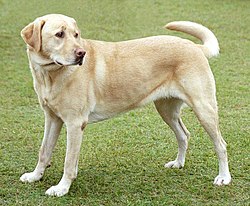песъ
Jump to navigation
Jump to search
See also: песь
Old East Slavic[edit]
Noun[edit]
песъ (pesŭ) m
- Alternative form of пьсъ (pĭsŭ)
Further reading[edit]
- Sreznevsky, Izmail I. (1902) “песъ”, in Матеріалы для Словаря древне-русскаго языка по письменнымъ памятникамъ [Materials for the Dictionary of the Old East Slavic Language Based on Written Monuments][1] (in Russian), volumes 2 (Л – П), Saint Petersburg: Department of Russian Language and Literature of the Imperial Academy of Sciences, column 1778
Old Ruthenian[edit]

Etymology[edit]
Inherited from Old East Slavic песъ (pesŭ), пь́съ (pĭ́sŭ), from Proto-Slavic *pь̀sъ. Cognate with Russian пёс (pjos), Old Church Slavonic пьсъ (pĭsŭ), Old Czech pes.
Noun[edit]
песъ • (pes) m animal (related adjective песый)
- dog
- Synonym: соба́ка (sobáka)
- естли бы в кого песъ домовыⸯ албо быдлѧ ꙗкую шкоду ꙋ ѡколицы чинило ― estli by v koho pes domovyj albo bydlja jakuju škodu u okolicy činilo ― (please add an English translation of this usage example)
Descendants[edit]
Further reading[edit]
- Hrynchyshyn, D. H., editor (1978), “песъ”, in Словник староукраїнської мови XIV–XV ст. [Dictionary of the Old Ukrainian Language of the 14ᵗʰ–15ᵗʰ cc.] (in Ukrainian), volumes 2 (Н – Ѳ), Kyiv: Naukova Dumka, page 140
- The template Template:R:zle-obe:HSBM does not use the parameter(s):
url=pes
Please see Module:checkparams for help with this warning.Bulyka, A. M., editor (2005), “песъ”, in Гістарычны слоўнік беларускай мовы [Historical Dictionary of the Belarusian Language] (in Belarusian), numbers 24 (паприца – побужоный), Minsk: Belaruskaia navuka, →ISBN, page 269
Categories:
- Old East Slavic lemmas
- Old East Slavic nouns
- Old East Slavic masculine nouns
- orv:Canids
- Old Ruthenian terms inherited from Old East Slavic
- Old Ruthenian terms derived from Old East Slavic
- Old Ruthenian terms inherited from Proto-Slavic
- Old Ruthenian terms derived from Proto-Slavic
- Old Ruthenian lemmas
- Old Ruthenian nouns
- Old Ruthenian masculine nouns
- Old Ruthenian animal nouns
- Old Ruthenian terms with usage examples
- zle-ort:Canids
- zle-ort:Dogs